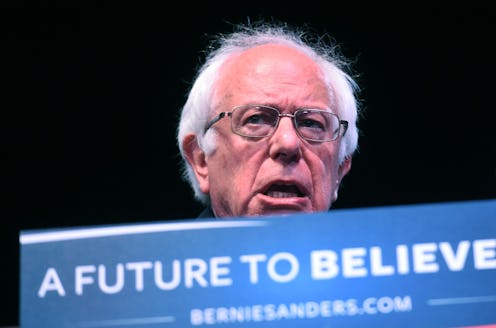News
Is West Virginia Too Little, Too Late For Bernie?
Once upon a time in 2008, Hillary Clinton won West Virginia in the Democratic primary. This year, however, it's looking more likely for Bernie Sanders to win West Virginia on Tuesday. Scoring the Mountain State after a recent victory in Indiana would certainly look good for Sanders, but would it actually do much to help him secure the Democratic nomination? At this point in the race, unfortunately, signs point to "no."
The primary in West Virginia looks promising for Sanders. According to the big forecasters, numbers lean toward him: FiveThirtyEight reported a 75 percent chance of Sanders winning. Public Policy Polling also reported Sanders (closely) leading in West Virginia with 45 percent of the vote to Hillary Clinton's 37 percent. It doesn't help Clinton that her comments on coal from a March town hall — she said on the transition to clean energy, "We’re going to put a lot of coal miners and coal companies out of business" — are giving her Black Lung. Predictably, West Virginians were riled up. Bill Clinton was booed when he stopped in the town of Logan on his wife's behalf; that is also where some local officials reportedly wrote an email to West Virginia Sen. Joe Manchin's staff, declaring that Bill and Hillary Clinton "are simply not welcome in our town."
But a win won't do much for Sanders at this point in the race because momentum from a few good primaries isn't enough to combat the reality of the Democratic delegate count. Clinton is under 200 delegates away from the 2,383 total delegates she needs for the nomination, but Sanders still needs close to 1,000. Clinton simply has far more delegates than Sanders does: 2,228 for her, 1,454 for him. The cold, hard numbers show that even a landslide victory for Sanders in coal country would singe Clinton's campaign a bit, but achieve not much else. Democratic strategist Joe Trippi told Politico, "I think even the wins don't do anything but continue the inevitable problem of he can't get there from here."
Sanders' primary wins do embolden his campaign to stay in the race and provide some optimism for his supporters. But is it meaningful to feel optimistic when he's still en route to meeting a dead end?
For Clinton, Sanders' wins hinder her from devoting all her time and energy against Trump. Trippi told Politico, "Every dollar that he [Sanders] spends and every time she[Clinton] has to defend against an attack or answer some accusation of his is money and time not spent defining Donald Trump and the Republican nominee." Sanders has made it abundantly clear that he plans to stay in the race, regardless of what (negative) effect it will have on the Democratic party for the national election. "I'm gonna be in it until the last vote is cast," Sanders told CBS Evening News last week.
Feelers of the Bern may be excited by last week's Indiana win, his potential West Virginia win in a few hours, and even a prospective Oregon win, a state that claims the only senator to endorse Sanders so far, Jeff Merkley. But I think that excitement means his supporters are not seeing the forest for the trees. A series of individual wins does not — in this case, will not — account for an overall win in the race for the Democratic nomination. Even if he gets a victory in West Virginia, Sanders still will only have a zombie-like campaign, ambling on when it could be put to rest.
